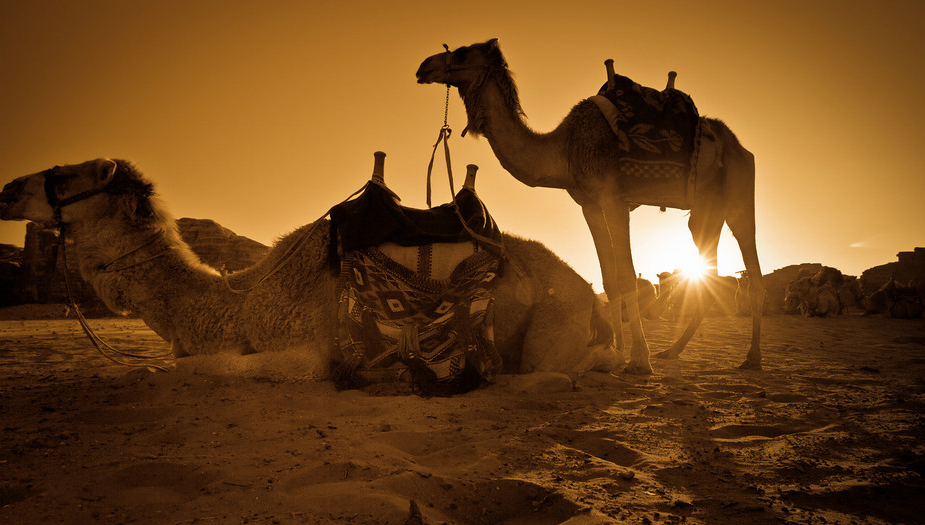
THE EMIGRATION
Thanks to the allegiance and support offered by the Ansaar, the Muslims found a new rrock of refuge.
The Prophet (r) commanded the Muslims in Makkah to emigrate from Makkah
and join their brothers-in-faith, the Ansaar, in Madinah. He told his companions,
“God has provided to you some brethren and homes where you will live in safety.”
So the Muslims departed, one small group after another, from Makkah to Yathrib, leaving the Prophet (r) behind in Makkah in anticipation of the command of Allah as to when he should leave the city.
But it was not easy to emigrate as the Quraysh decided at once to take stringent measures
against them.
The pagan Quraysh did everything they could to stop the exodus such as creating obstacles along the way of the emigrants to prevent their departure.
The Muslims, though, were equally determined to leave at all costs. Some, like Abu Salama, had departed alone, leaving their wives and children, while others, like Suhayb, had to give up their lifelong earnings before leaving Makkah. Umm Salama relates the following about her and her husband’s departure:
“When Abu Salama had made up his mind to set out for Madinah, he saddled his camel and mounted me on it with my son Salama. Then, taking hold of the camel’s halter, he went
ahead. When some of the men belonging to Bani al-Mughari saw him,
they came near us saying,
“It is alright so far as you are concerned, but how can we allow your wife to go with
you?”
They snatched the camel’s headstall from his hand and took me with them. At this
crucial point, Banu ‘Abdul Asad, the clansmen of Abu Salama, got angry. They said:
‘By God, you have torn her from our brother, but we will not allow our son to go with her.”
A scuffle started between them for the child Salama, until his arm was dislocated, and Bani Asad took him away leaving me with Bani al-Mughira while my husband went away to Madinah.
Thus, all the three of us my self, my husband and my son were separated. I used to go out every morning to Abtah weeping till nightfall. A whole year passed in this manner when one of my cousins from Al-Mughira took pity on me and said to Bani al-Mughira:
“Why don’t you let this poor woman go? You have separated her from her husband and son.”
So they said to me: “You can go to your husband if you like.”
Then Banu Asad reunited me with my son. I saddled my camel and taking the child with me, set out for Madinah in search of my husband accompanied by not a blessed soul with me.
When I arrived at Tan’im I happened to meet ‘Uthman Ibn Talha of Bani ‘Abdul-Dar who asked me where I intended to go.
I replied that I was going to my husband in Medinah.
He asked if I had anybody with me to which I said in reply,
‘None save this child and God.’
He said,
‘By God, it is not easy for you to reach your destination’.
He took hold of the camel’s rope and went ahead leading it. I swear, I have never met a man nobler than he. Whenever we had to stop, he used to kneel the camel and withdraw; after I had got down, he used to unload the camel, tie it to a tree and go away to take rest under a tree.
In the evening, he used to saddle the camel and load it, and then withdrew asking me to ride; he came back after I had mounted and taking the halter in his hand, he went ahead to the next destination…
thus he escorted me until I reached Madinah.
When he saw Quba, the habitation of Bani ‘Amr Ibn ’Auf, he said,
‘Your husband is in this village. Now go to him with the blessing of God.”
Thus he bade me farewell and went off on his way back to Makkah.”
She also used to say that no family in Islam suffered the hardships the way that the family
of Abu Salama did. (Ibn Kathir, Vol.2, PP.215-17)
When Suhayb tried to leave for Madinah, the disbelieving Quraysh said to him,
“You came to us as a destitute beggar and have grown rich among us, and now you want to go away safely with your life and wealth. By God, it shall never be so!”
Suhayb asked, “Would you allow me to go if I give my property to you?”
When they replied in the affirmative, Suhayb said,
“I will give you the whole of it.”
When the Prophet (r) was told about the incident, he exclaimed,
“Suhayb has made a profit! Suhayb has made a profit!” (Ibn Kathir, Vol.2, P.233)
The emigrants to Medinah during this period were ‘Umar, Talha, Hamza, Zayd Ibn Haritha,’
Abdur Rahman Ibn Auf, Zubayr Ibn al-Awwam, Abu Hudhayafa, ‘Uthman Ibn’ Affan and several other companions of the Prophet (may Allah be pleased with them all).
Thereafter, the emigrants trickled away one by one. The only ones left in Makkah, besides the Prophet(r), Abu Bakr and ‘Ali (t) were either those who are detained because of some restraints or those who had fallen victims of their own shortcomings.
AN UNSUCCESSFUL CONSPIRACY
The emigration of Muslims to Madinah frightened the Makkahns.
For they fully understood that the Prophet (r) had already established a base with a large number of adherents in a foreign territory beyond their reach, and if he were also to join them there,
then they would be rendered helpless, deprived of all authority over him. They held a council in Dar alNadwa where all the chiefs of the Quraysh had assembled to deliberate on the possible solutions to the problem.
They debated and scrutinized the various suggestions and finally decided unanimously that each clan should provide a young, courageous and blue-blooded warrior so that all of them would fall upon Muhammed to jointly kill him.
Thus, the responsibility of shedding his blood would lie equally on all the clans, and no single clan whatsoever would then be held responsible for it and ‘Abdu Munaf for sure, would not dare take up a hatchet against all the people.
Determined to slay the Prophet (r), the pagans dispersed to execute their treacherous scheme.
But the Prophet (r) was warned of their wicked plan by the All-Knowing God and thus,
had asked ‘Ali instead to lie on his bed and wrap himself in his mantle, assuring him that no harm would come to him.
The shrewd and determined gang stood outside the Prophet’s house with scimitars, prepared to attack the Prophet (r) as he emerged.
When Muhammed (r) came out, he threw a handful of dust. God instantly obscured their eyesight and the Prophet (r) went through their ranks, sprinkling the dust over their heads and reciting the Soorah Ya Sin:
“And we have set a bar before them and a bar behind them, and (thus) have covered them so that they see not.” [Qur’an 36:9]
He passed right through them but nobody was able to see him.
Then, there came a man who asked them,
“What are you waiting for?”
When they replied that they were waiting for Muhammed,
he said, “May God confound you! He has already gone away.”
They peeped through the chink of the door and saw ‘Ali sleeping on the bed wrapped in the Prophet’s mantle. They had mistaken him for the Prophet (r) and decided to wait till morning when ‘Ali got up from the bed. All of them were abashed by the incident.
A STRANGE INCONSISTENCY
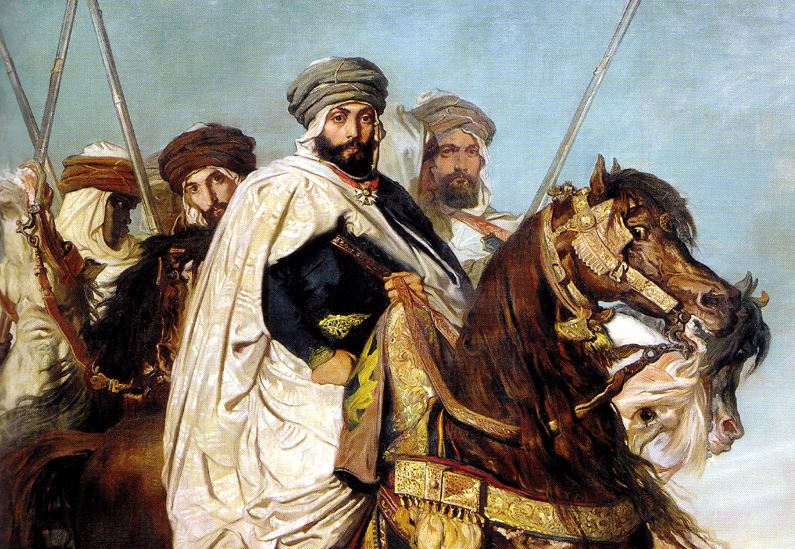
The unbelieving Quraysh of Makkah were bitterly set against the Prophet (r). Yet they were absolutely convinced of his truthfulness and trustworthiness, nobility and magnanimity.
If anybody in Makkah apprehended loss or misappropriation of his property, he usually deposited it with the Prophet (r).
The Prophet (r) had thus a number of things committed to his care. He, therefore, charged ‘Ali to return these to their owners before leaving Makkah. Of a fact, such strange behavior from Quraysh and such noble behavior from the Prophet at such a critical moment is a testimony to the nobility of the Prophet (r) as well as to the callousness of Quraysh.
“We know well how their talk grieveth thee, though in truth they deny not thee (Muhammed) but evil-doers flout the revelations of Allah.” [Qur’an 6:33]
The fact that the polytheists trusted Allah’s Messenger (r) with their possessions, even though they were fighting against him and insisting upon his death,
is an evidence that the enemies of the mission, deep in their hearts, believed in the righteousness, honesty, and nobility of the reformer.
They believed that he was better off than them in his behavior and that his heart was purer than theirs.
But the insensitivity or indifference of their hearts, their stubbornness, and their resolute grip towards their errant customs and beliefs, aptly known as resistance to change, lured them to fight against him, harm him and finally conspire to kill him.
Prophet’s Emigration
The Prophet (r) came to Abu Bakr and told him
that God had given him permission to emigrate from Makkah
.Abu Bakr exclaimed,
“Together, O Prophet (r) of God?”
; for he was anxious to keep him company.” Then Abu Bakr presented two camels he had been keeping for the purpose. ‘Abdullah Ibn Urayqit was hired by Abu Bakr to act as a guide.
The emigration of the Prophet (r) illustrates how everything howsoever coveted by one can be sacrificed for the sake of one’s faith or ideals.
Worldly estate and effects or any other thing that a man is disposed to value can never take the place of his faith nor can the faith be bartered away for the entire world. For what does it profit a man if he gains the whole world but suffers the loss of his soul.
Makkah was the birthplace of the Prophet (r).
As the homeland of the Prophet (r) of God and his companions, it was very dear to them.
It also had the house of God, loved and adored by them like the light of one’s eye.
But nothing stood in the way of their bidding farewell to their hearts and homes, families and kinsmen. This was due to the fact that the pagans of Makkah would not allow them the freedom of conscience and liberty to practice their faith.
The Prophet (r) loved Makkah but he valued his faith more.
One was a natural feeling of affection and the other an insatiable thirst of soul.
We find the two tenderest feelings of human nature articulately expressed by the Prophet (r) while leaving Makkah.
“No city is sweeter to me than you, are and how ardently I love you.
Had my people not exiled me, I would never have lived anywhere else.” (Tirmidhi, Chap. Fadl Makkah) The Prophet (r) had, in truth, to leave his homeland to fulfill his Lord’s command.
“O my bondmen who believe! Lo! My earth is spacious. Therefore serve Me only.” [Qur’an
29:56]
TOWARDS THE CAVE OF “MT. THAWR (Emigration WAY)
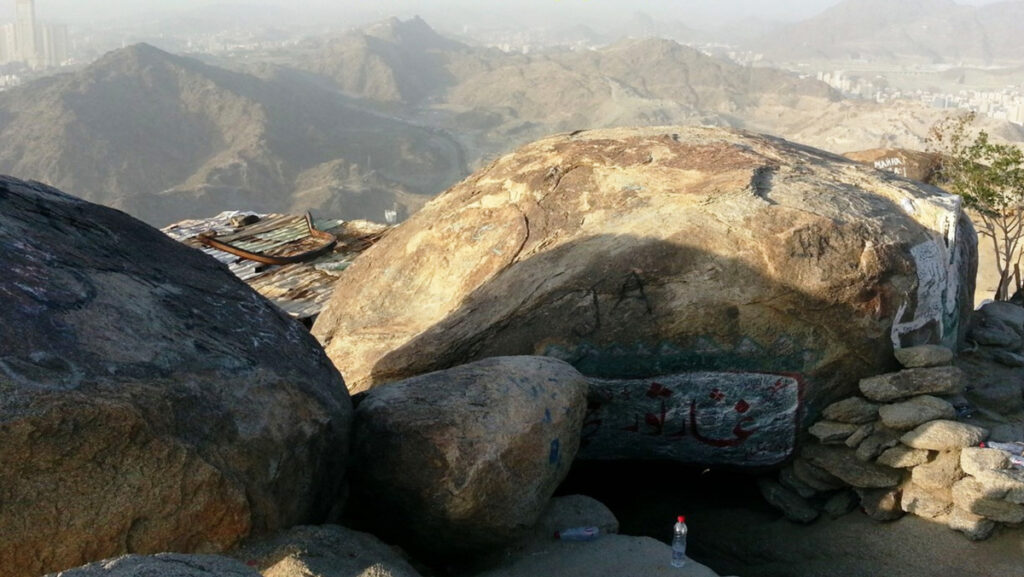
The Prophet (r) and Abu Bakr stealthily proceeded to the cave of Mt. Thawr.
Abu Bakr instructed his son ‘Abdullah to find out the hostile plans and conversations of the Makkans concerning them and then relay these to him.
Furthermore, he asked Amir Ibn Fuhayrah, his slave, to feed his flocks of milch ewe by the day and bring food for them in the evening.
Asma, his daughter, used to bring food for them at night.
Abu Bakr exhibited great concern for the Prophet of God (r) during this journey. It is related that when the Prophet (r) set out for the cave on Mt. Thawr, Abu Bakr (t) sometimes went ahead of the Prophet (r) and then behind him, until the Prophet (r) noticed his restlessness and asked, Abu Bakr (may Allah be pleased with him), what’s the matter? Often you come behind me and sometimes you go ahead!”
Abu Bakr (t) replied, “O Prophet (r) of God, when I think of those pursuing you, I come behind you but then I apprehend an ambuscade so that I go in front of you.”
When they arrived at the cave in Mt.
Thawr, Abu Bakr requested the Prophet (r) to wait until he had searched and cleaned up the cave. So, he went in, explored it and came out after cleaning up.
Then he remembered that he had not properly searched one hole.
He again asked the Prophet (r) to wait a bit so he can check it for the second time around.
Only then did he allow the Prophet (r) to enter the cave after he had fully convinced himself that it did not harbor wild or dangerous beasts.
A MOST CRITICAL MOMENT OF HUMAN HISTORY IN EMIGRATION
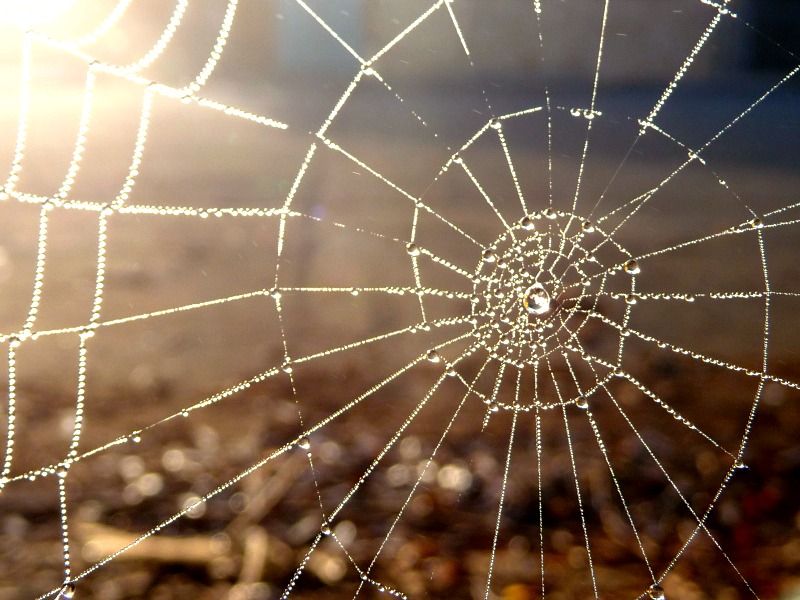
The most critical moment of the world’s history,
when the fate of mankind hanged by a thread, drew near as the Qurayshite horsemen on the look out for the two fugitives galloping over the desert and came to the cave where the two had secluded themselves.
The world was as if at a standstill, holding its breath in suspense: The pursuers, who stood debating among themselves at the mouth of the cave, resolved that nobody could be inside it.
One may think it is fantastic or miraculous but it was how God helped His Prophet (r).
“Then Allah caused His peace of reassurance to descend upon him and supported him with hosts ye cannot see.” [Qur’an 9:40]
Peering, Abu Bakr looked over his head.
He saw the blood-thirsty warriors of the Quraysh standing at the mouth of the cave.
Then he said to his companion with a trembling heart,
“O Prophet of God, they will see us if anybody steps forward.”
“What misgivings have you,” replied the Prophet (r), “about the two with whom the third is Allah?” It was as if to remind that at this event, the revelation came down from God: “When they two were in the cave, when he said to his comrade: Grieve not, Lo! Allah is with us.” [Qur’an 9:40]
SURAQA FOLLOWS THE PROPHET (r)
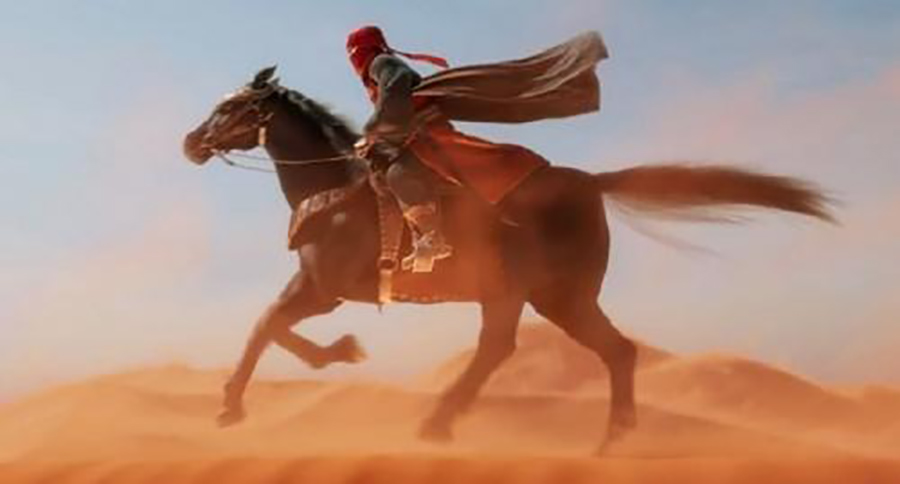
The Quraysh offered a reward of one hundred camels to anyone who brought back the Prophet (r), dead or alive.
The Prophet (r) spent three nights in the cave and then guided by ‘Amir Ibn Fuhayrah went along the road by the sea-coast.
Suraqa Ibn Malik Ibn Ju’shum heard of the price set by the Quraysh on the head of the Prophet (r) and hurried after him.
The reward of hundred camels was too tempting for him that he got up on his mare and
went after the fugitives tracking their footsteps.
He let his mare run swiftly until he nearly over-took the fugitives. But, lo, his mare stumbled abruptly, and hitherto, he was thrown off.
He rose up, composed himself, and remounted the mare, and let her go ahead.
Once more, the mare stumbled and he was again thrown off, but nevertheless continued the
chase until he could see the three men going ahead.
Suddenly, his mare stumbled for the third time, its fore-legs sinking up to the knees on the ground, and he was thrown off once again.
He also saw dust rising from the ground like a sandstorm.
Suraqa was now convinced that the Prophet (r) was protected against him and he would
not in any case triumph over the latter.
He called out saying that he was Suraqa Ibn Ju’shum and that he would not inflict any harm to them.
The Prophet (r) ordered Abu Bakr to ask him what he wants from them.
Suraqa replied, “Write for me a warrant of security.”
Thereupon the Prophet (r) ordered ‘Amir Ibn Fuhayrah to write the warrant which he wrote on a piece of tanned leather or bone. Suraqa preserved the document as a memento of sorts.
(Ibn Hisham, Vol. I, pp. 489-90; Al-Bukhaari, Chap. Hijratun Nabi)
The Prophet of God (r) had been driven out of his homeland and the enemy pursuing him
was after his blood, but his mind’s eye was envisioning the day when his followers would be
ascendant upon the realms of the Caesars and Chosroes.
In those adverse circumstances, in the darkest hour of his life, he made a prediction of the bright times ahead. To Suraqa he said,
“Suraqa, how will you feel when you will put on Chosroes’ bracelets?”
God has indeed promised succor, victory and prosperity to His Prophet (r) and the triumphant ascendancy of His Religion of Truth.
“He it is who hath sent His messenger with the guidance and the Religion of Truth, that He may cause it to prevail over all religions, however much the disbelievers may be averse.” [Qur’an 9:33]
Those who cannot see beyond the material agency of causes and effects would shrug their
shoulders at this prediction:
the Quraysh discarded the forebodings of the Prophet (r) as incredulous and inconceivable, but the foreseeing Prophet (r) was peeping into the future:
“Lo! Allah faileth not to keep the tryst.” [Qur’an 13:31]
And the events took shape exactly in the same way as the Prophet (r) had foretold to Suraqa.
When Persia was conquered and the tiara, robe and the bracelets of Chosroes were brought to ‘Umar, he sent for Suraqa and asked him to put on the royal dress. (Al-Isti’ab, Vol. II, p. 597)
Suraqa took the warrant of security for he was by then convinced of the victory of the Prophet (r).
He offered some provisions and utensils, but the Prophet (r) accepted nothing from him. He simply said to Suraqa, “Keep our whereabouts secret.”
THE BLESSED GUEST
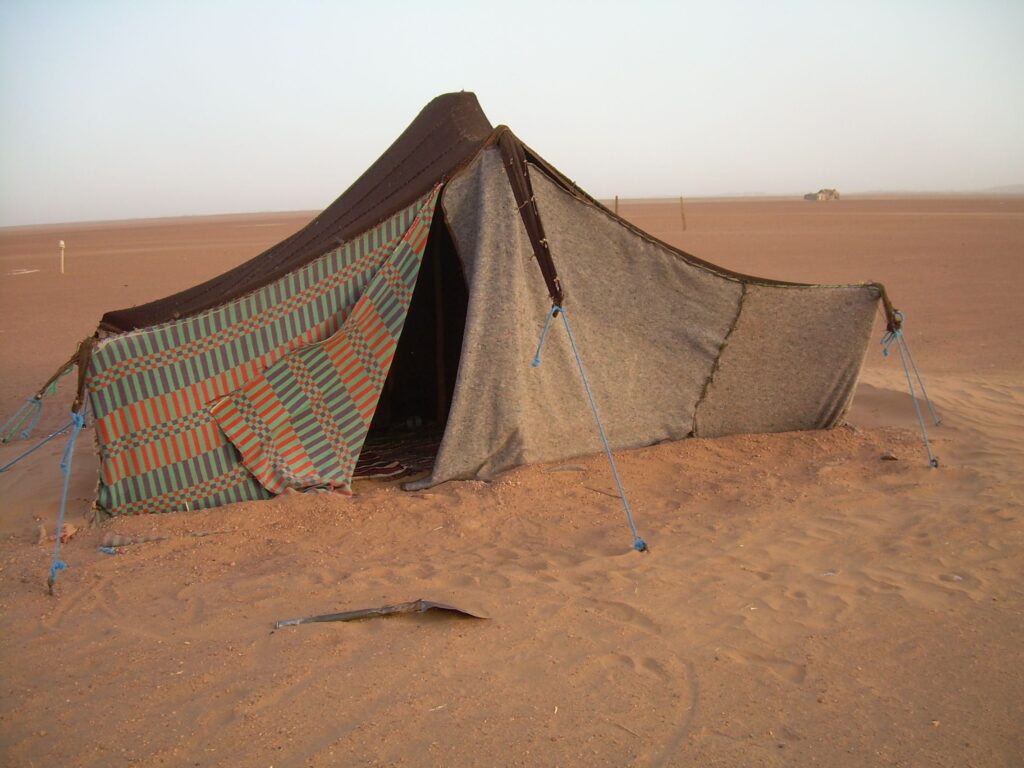
Abu Bakr and the Prophet (r) passed by the tent of Umm M’abad, a woman of Khuza’a, who had a milk ewe but its udder had dried up owing to drought.
God’s Messenger wiped its udder with his hand and mentioning the name of God the most High.
He prayed that Umm M’abad might have a blessing in her ewe. It then gave a flow of milk.
He first gave Umm M’abad and others a drink until all of them were fully satisfied, then he drank knowing everyone was through.
He milked it the second time around and when the vessel was full, left it with her.
When Abu M’abad came back and his wife told him about the prodigious happening and the angelic stranger,
he replied,
“By God, he appears to be the same man of the Quraysh whom they are prowling after.”
They continued their journey with the guide until they reached Quba in the vicinity of Madinah. This was on Monday, the 12th day of Rabi ul-Awwal. (24th September, 622 A.D.) A new era was indeed commencing, because it was from the start of this year that the Islamic
calendar of Hijrah took its humble beginnings!
for prophets stories visit https://sunofislam.com/prophetsofgod/
for scientific miracles articles visit www.sunofislam.com
